




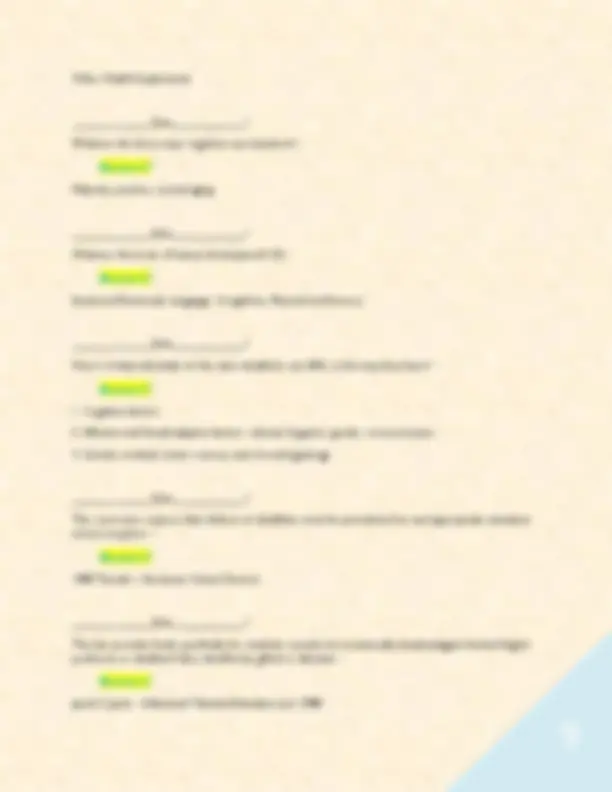








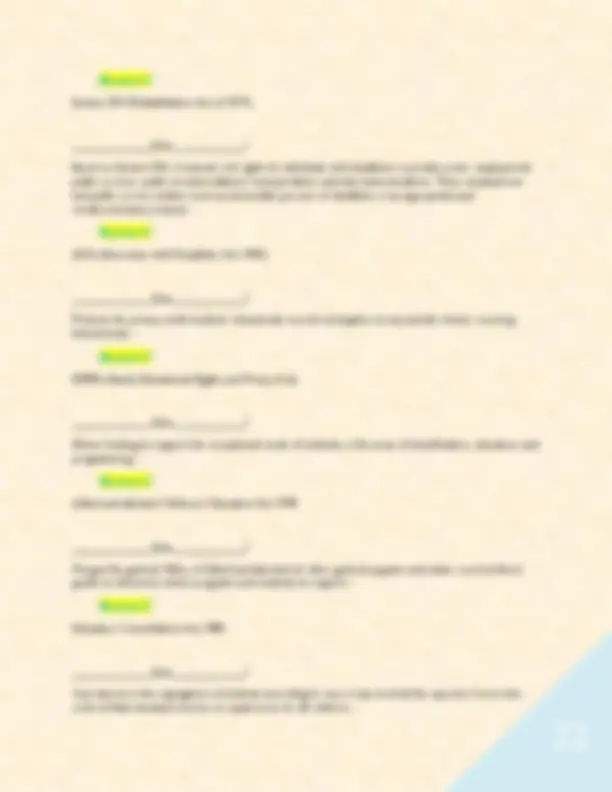


















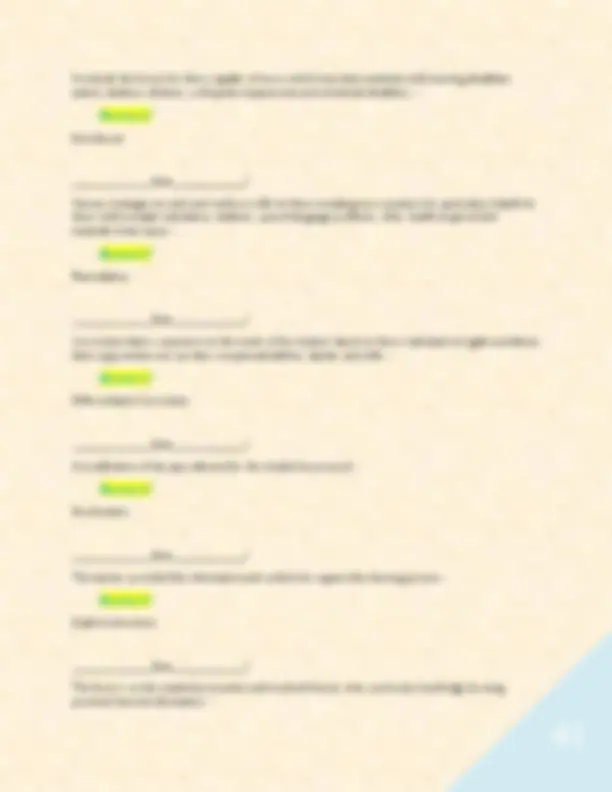















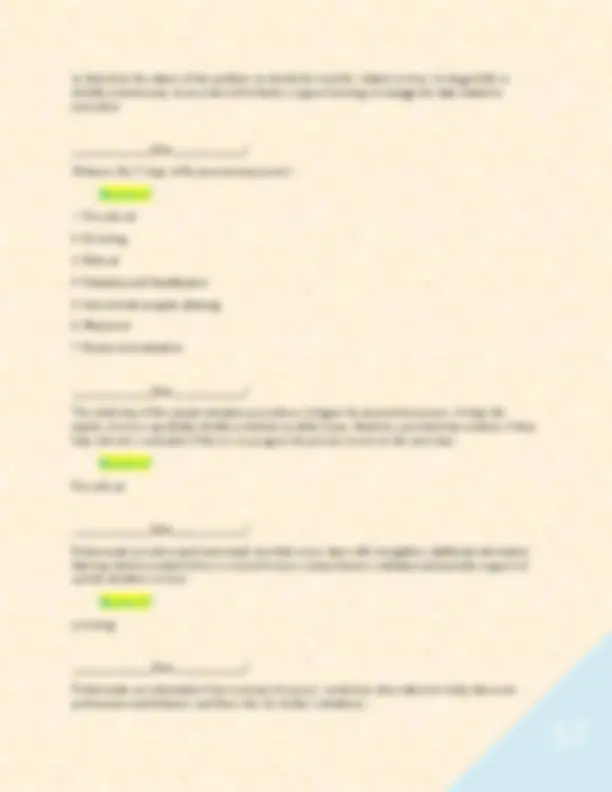


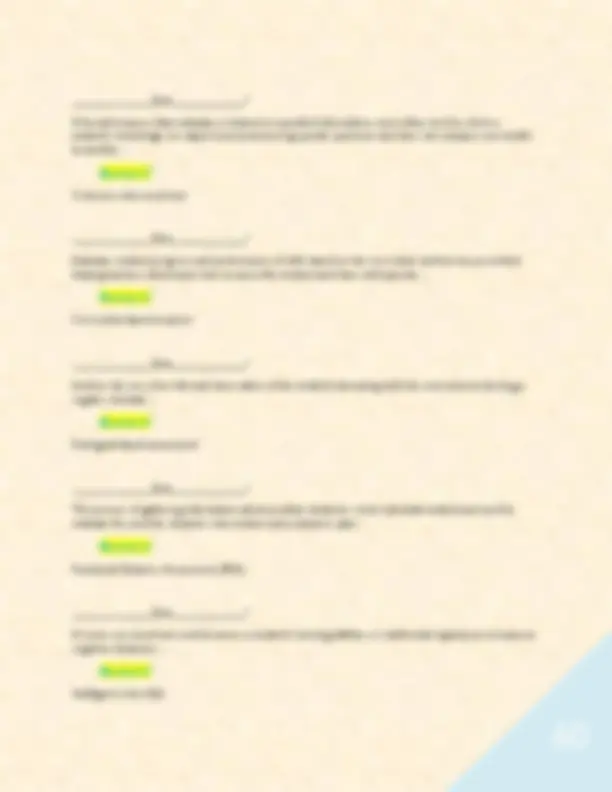































Study with the several resources on Docsity

Earn points by helping other students or get them with a premium plan


Prepare for your exams
Study with the several resources on Docsity

Earn points to download
Earn points by helping other students or get them with a premium plan
Community
Ask the community for help and clear up your study doubts
Discover the best universities in your country according to Docsity users
Free resources
Download our free guides on studying techniques, anxiety management strategies, and thesis advice from Docsity tutors
Praxis: Special Education (Core Knowledge & Applications Athens State University Collaboration/Special Education) Expert Verified Actual Questions & Answers for Guaranteed Pass | Newest Update, 2025-2026. Terms in this set (433) _____________Quiz____________? What is required for all children who are identified as disabled and require special services? - Answer✓✓ IEP - Individual Education Plan _____________Quiz____________? Difficulties using expressive and receptive language, delays in pragmatics and problems with fluency, voice, and articulation - Answer✓✓ Speech/Language Impairment _____________Quiz____________? Achievement is not commensurate with abilities and demonstrates difficulties w/ listening, reasoning, memory, attention, social skills, perception, and processing information which may emerge w/ problems in reading, written language, math, and behavior. - Answer✓✓ Specific Learning Disablity
Typology: Exams
1 / 89

This page cannot be seen from the preview
Don't miss anything!


















































































Terms in this set (433) _____________Quiz____________? What is required for all children who are identified as disabled and require special services? -
IEP - Individual Education Plan _____________Quiz____________? Difficulties using expressive and receptive language, delays in pragmatics and problems with fluency, voice, and articulation -
Speech/Language Impairment _____________Quiz____________? Achievement is not commensurate with abilities and demonstrates difficulties w/ listening, reasoning, memory, attention, social skills, perception, and processing information which may emerge w/ problems in reading, written language, math, and behavior. -
Specific Learning Disablity
_____________Quiz____________? Conditions of medical problems w/ limited strength, vitality, and alertness such as diabetes, epilepsy, attention deficits, and disease. -
Other Health Impairments _____________Quiz____________? Physical problems such as cerebral palsy, muscular dystrophy, and Spina Bifida, possibly requiring adaptations w/ devices and equipment. -
Orthopedic Imprairments _____________Quiz____________? Deficits in adaptive behaviors problems w/ learning related to cognition, difficulties w/ memory, issues w/ problem solving, delays in social skills, difficulties generalizing skills, and attention problems. -
Intellectual Disability _____________Quiz____________? Difficulties processing linguistic information and using spoken language to communicate problems w. social relationships, deficits in emotional maturity, and delays in academics. -
Hearing Impairments _____________Quiz____________? Exhibits inappropriate internalizing and externalizing behaviors, atypical emotions, and disruptive behaviors and lacks the skills for developing positive relationships. -
Emotional Disturbance / Behavioral Disorder
Language _____________Quiz____________? The ability to understand and comprehend information that is presented. -
Receptive Language _____________Quiz____________? Ability to communicate thoughts, feelings, and ideas through words gestures, sign systems, assistive devices, and so on. -
Expressive Language _____________Quiz____________? Using movments of the mouth area to make speech sounds -
Articulation _____________Quiz____________? Development that focuses on thinking and reasoning w/ specific clusters that are important in all aspects of learning. -
Mental Skill Development - Cognition _____________Quiz____________? A system of combining words into sentences w/ rules that govern how words work together in phases, clauses, and sentences. -
Syntax
_____________Quiz____________? The meaning of language communicates; it governs vocabulary development. -
Semantics _____________Quiz____________? Knowledge of successful and appropriate language use, such as in conversion. -
Pragmatics _____________Quiz____________? What are the four areas of the Social/Emotional domain? -
Self-Concept; Self-Confidence; Self-Esteem; and Self-Competence _____________Quiz____________? Includes various behaviors, adaptive behavior deficits, disruptive behaviors, and withdrawl -
Psychological _____________Quiz____________? Includes affective behaviors, poor social skills, poor self-concept, poor motivation, and debilitating mood states. -
Social _____________Quiz____________? This affects all areas of development is the most significant, and can transform, through maturity, practice, and normal aging. -
_____________Quiz____________? How muscles coordinate movments with the information recieved through the environment by the senses. -
Perceptual Motor _____________Quiz____________? Use of sensory information such as tactile, vestibular, and proprioceptive -
Sensory-Integration _____________Quiz____________? Small muscle movment of the hands, fingers, feet, toes, face. -
Fine Motor _____________Quiz____________? Large Muscle movment such as in the torso, neck, arms, legs. -
Gross Motor _____________Quiz____________? What are the four areas of physical development? -
Gross Motor, Fine Motor, Sensory-Integration, Perceptual Motor _____________Quiz____________? The first area of growth and learning that a child experiences. -
Physical Development _____________Quiz____________? Difficulties in the areas of cognition, memory, attention, judgment, and problem solving, as well as physical and sensory changes, social, behavioral, or emotional problems. -
Traumatic Brain Injury _____________Quiz____________? When are children eligible for services? -
The condition has a major impact of learning and a special program is mecessary to benefit from an education. _____________Quiz____________? A syndrome related to neuralogical function that is evidence by deficits in social interactions, communications and patterns of behavior, various disorders in the group are differentiated by age of on- set and severity of symptoms. -
Autism _____________Quiz____________? Defines an individual w/ significant subaverage general intellectual functioning concurrently w/ deficates in adaptive behavior manifesting during the developmental period and adversely affecting performance. -
Intellectual Disability _____________Quiz____________? Related to diseases or chronic health conditions a student w/ limited strength, vitality, or alertness that adversely affects educational performance. -
_____________Quiz____________? What is the primary factor in the dignosis of mental retardation? -
Lack of appropriate adaptive behavior skills. _____________Quiz____________? Includes the combination of both auditory and visual disablities that are the cause of sever communication deficts and other learning problems, individual may need a combination of supplementary assistance. -
Deaf-Bindness _____________Quiz____________? A combination that may adversely affect the educational performance of students and includes deafness and hard of hearing. -
Hearing Impairment _____________Quiz____________? A combination of impairments that causes severe educational conditions that connot be accommodated in special education programs for only one disablity -
Multiple Disabilites _____________Quiz____________? Communication disorders that affect the educational performance in an adverse manner including stuttering, impaired articulation, language impairments, or voice imparments. -
Speech/Language Impairment
_____________Quiz____________? Significant deficits in development -
Developmental Disabilities _____________Quiz____________? What are the 13 categories of disablities? -
Autism (A) _____________Quiz____________? Who is affected by Autism more? And at what rate? -
Boys are 4 times as often affected. _____________Quiz____________? What is the second largest category of exceptional students? -
Communication Disorder _____________Quiz____________? Who is affected by Communication Disorder more? -
Boys _____________Quiz____________? What is the 4th largest category of exceptional students? -
Emotional Disturbance/Behavioral Disorder _____________Quiz____________? What is the second largest group of students receiving services? -
Gifted/Talented _____________Quiz____________?
What is the largest category of exceptional students being served? -
Learning Disablity _____________Quiz____________? What is the third largest category of exceptional students? -
Intellectual Disability _____________Quiz____________? What category of exceptional students makes up 10% of the special education population? -
Intellectual Disability _____________Quiz____________? Children in this category exibit two or more conditions of disablity, with one being a category or sensory impairment. -
Multiple Disabilities _____________Quiz____________? What is the most commonly acquired disablity? -
Traumatic Brain Injury (TBI) _____________Quiz____________? What may be caused by neurobiological conditions, abnormal brain development, genetics, multiple biological causes, and environmental factors? -
Autism
What is caused by damage or dysfunction of a specific parts of the body, environmental factors, cognitive impairments, hearing loss, brain injury, or disease? -
speech/Language Impairment _____________Quiz____________? What is caused by damages or changes in the optical, muscular, or nerve system, which may be related to diseases, trauma, malnutrition, or genetics? -
Visual Impairment _____________Quiz____________? How can some disablities be prevented? (10) -
Duration
_____________Quiz____________? The measure of how problematic or complicates a particular behavior is -
Degree of Severity _____________Quiz____________? A reinforcement for a previously reinforced behavior is w/held, so the behavior will decrease until it no longer exisits -
Extinction _____________Quiz____________? the amount of thime (how often) that a behavior reoccures. -
Frequency _____________Quiz____________? The degree to which a behavior is repeated -
Intensity _____________Quiz____________? The extent that a previously learned behavior continues after the intervention to support it has been ended. -
Maintenance _____________Quiz____________? List three of the more complicated multiple combinations of exceptionalities. -
Individuals w/ Disabilities Education Improvement Act _____________Quiz____________? What are the four key purposes of IDEIA? -
Zero reject (Child Find system) _____________Quiz____________?
Nondiscriminatory identification and evaluation must be conducted, which includes procedures followed and tools utilized. -
Non-bias testing _____________Quiz____________? The education of students w/ disibilities must be at the public expense based on the development of an IEP that includes related services -
Free and Apppropriate Public Education (FAPE) _____________Quiz____________? Children w/ disablities must be educated w/ non-disabled children to the maximum extent appropriate and a contimuum of placement services must be imposed. -
Least Restrictive Environment (LRE) _____________Quiz____________? Requires parent and student rights regarding assessment, placement, and service implementation of education program be instituted. -
Due Process Procedures (Procedual Safeguards) _____________Quiz____________? Parents and students (as appropriate) must be included in the special education process helping to make plans and decisions. -
Shared Decision Making _____________Quiz____________? What are 4 changes found in the IDEIA? -